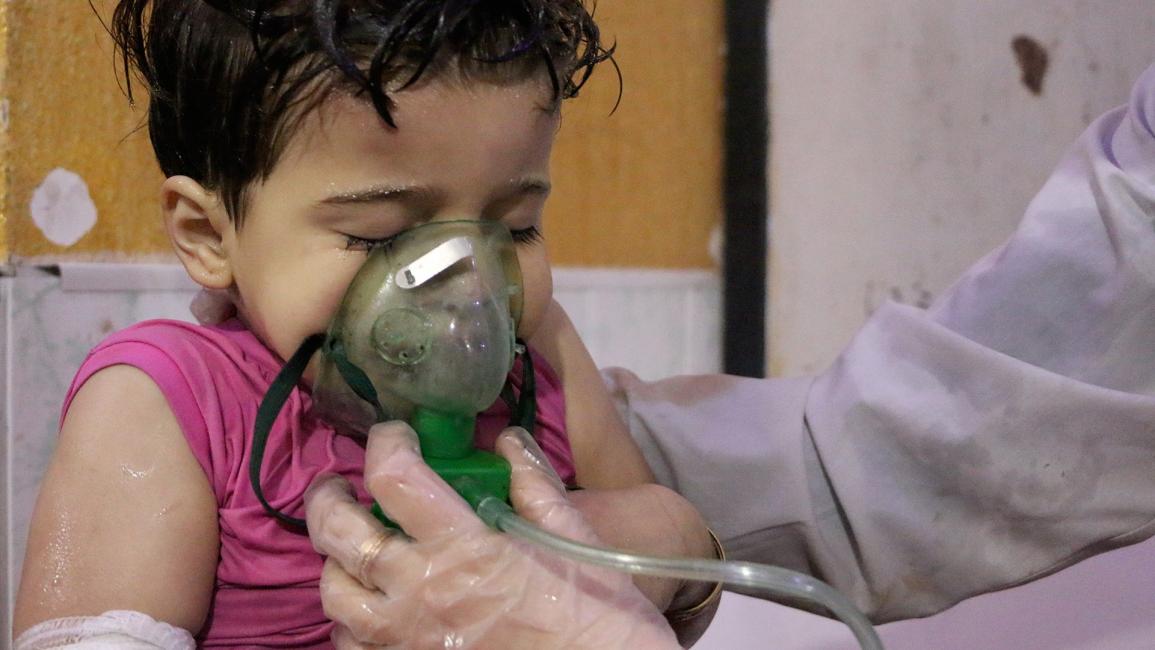EU says 'evidence points' to chemical attack by Syria regime
EU says 'evidence points' to chemical attack by Syria regime
The EU has said the evidence points towards "yet another" chemical attack by the Assad regime.
2 min read
The Assad regime has carried out numerous chemical attacks in Syria (Getty)
The EU said Sunday that evidence suggested the Syrian regime carried out a chemical attack in Douma and urged Damascus's allies Russia and Iran to help prevent another one.
The European Union's diplomatic arm said it condemns "in the strongest terms" the use of chemical weapons and called for an "immediate response" from the international community.
"The evidence points towards yet another chemical attack by the regime," the European External Action Service (EEAS) said, referring to the government of President Bashar al-Assad.
"We call on the supporters of the regime, Russia and Iran, to use their influence to prevent any further attack and ensure a cessation of hostilities," in line with UN Security Council resolution 2401, it said.
The EU has joined others in the international community to express outrage over the alleged chemical attack that left dozens dead in Syria's rebel-held town of Douma.
US President Donald Trump has warned there would be a "big price to pay".
The EU said it was "highly regrettable" that Russia vetoed in November the extension of a panel that the UN Security Council set up in 2015 to determine who was behind an earlier suspected chemical attack.
"The EU calls upon the UN Security Council to rapidly re-establish this (joint investigative) mechanism to identify perpetrators of chemical attacks," the statement said.
It recalled that in June 2017 and March this year, the EU had imposed additional sanctions on senior officials and scientists linked to suspected chemical weapons use in Syria.
"It is a matter of grave concern that chemical weapons continue to be used, especially on civilians," the EU statement said, referring to a similar attack nearly a year ago.
Sarin was detected in an April 2017 attack on the northwestern town of Khan Sheikhun that killed more than 80 people. The agent was released after an air strike.
The EU will make sure that those responsible for chemical attacks "are held accountable," according to the statement by an EESS spokesman.
The European Union's diplomatic arm said it condemns "in the strongest terms" the use of chemical weapons and called for an "immediate response" from the international community.
"The evidence points towards yet another chemical attack by the regime," the European External Action Service (EEAS) said, referring to the government of President Bashar al-Assad.
"We call on the supporters of the regime, Russia and Iran, to use their influence to prevent any further attack and ensure a cessation of hostilities," in line with UN Security Council resolution 2401, it said.
The EU has joined others in the international community to express outrage over the alleged chemical attack that left dozens dead in Syria's rebel-held town of Douma.
US President Donald Trump has warned there would be a "big price to pay".
The EU said it was "highly regrettable" that Russia vetoed in November the extension of a panel that the UN Security Council set up in 2015 to determine who was behind an earlier suspected chemical attack.
"The EU calls upon the UN Security Council to rapidly re-establish this (joint investigative) mechanism to identify perpetrators of chemical attacks," the statement said.
It recalled that in June 2017 and March this year, the EU had imposed additional sanctions on senior officials and scientists linked to suspected chemical weapons use in Syria.
"It is a matter of grave concern that chemical weapons continue to be used, especially on civilians," the EU statement said, referring to a similar attack nearly a year ago.
Sarin was detected in an April 2017 attack on the northwestern town of Khan Sheikhun that killed more than 80 people. The agent was released after an air strike.
The EU will make sure that those responsible for chemical attacks "are held accountable," according to the statement by an EESS spokesman.



